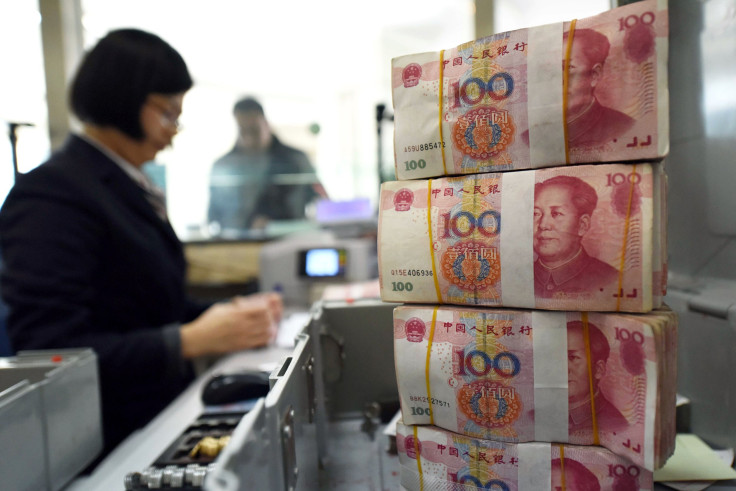China Denies It Has Tightened Currency Controls As Government Insists No Plan To Devalue Yuan Further

SHANGHAI — China’s foreign exchange administration has denied foreign media reports that the country has imposed undisclosed restrictions on capital outflows, which have risen sharply in recent months amid a slowing economy and speculation about further devaluation of China’s currency the yuan. Observers said the unusually swift response to reports by the Wall Street Journal represented an attempt to get a grip on perceptions that the yuan, which has lost more than 5 percent of its value since last summer, will continue to depreciate significantly.
The comments by the State Administration of Foreign Exchange (SAFE) on its official social media account follow criticisms that China has failed to explain its economic policies clearly, after an unexpected devaluation of the yuan last August and sharp falls in the value of Chinese stocks alarmed global markets.
China always had some controls on currency movements. Ordinary citizens are not allowed to convert more than $50,000 worth of yuan into foreign currency every year. And analysts say that worries about outflows, which reached some $108 billion in December, have led to new restrictions in recent months — including the suspension of foreign exchange business by several foreign banks operating in China until the end of March, and new rules on the capital reserves foreign banks must hold in China.
But worries about further damaging foreign investor sentiment may be behind the swift denial of the report by the Journal that the government had introduced new and undisclosed rules "curbing the ability of foreign companies in China to repatriate earnings," which it said risked "undermining Beijing’s ambition to elevate the yuan’s profile on the world stage."
On its microblog account, the SAFE said Thursday: "Some media reports said that China would curb the repatriation of profits by foreign companies in China, which is not true. There is no change in the relevant policies."
In another move seen as aimed at reassuring investors, China’s Premier Li Keqiang told the International Monetary Fund Thursday that China had no intention to devalue the yuan to boost exports, and would not start a trade war. Li stressed that the yuan had stayed “basically stable” against a basket of currencies including the euro and the Japanese yen. He also pledged to “enhance communication with the market”.
The comments came in a call to IMF Managing Director Christine Lagarde, who said China needed to improve its communication, during a debate at the World Economic Forum (WEF) in Davos last week. China’s Xinhua News Agency was also quick to tweet Friday that the yuan had risen in offshore markets.
China’s central bank on Thursday also pledged to pump more liquidity into the country's economy over the coming week ahead of Chinese New Year. The pledge followed the bank's largest cash injection into the economy in three years — some 690 billion yuan (more than $100 billion) in the first four days of this week.
The move seems to have given some reassurance to China's stock markets, which rose more than 3 percent Friday, after falling some 9 percent in the first four days of the week, apparently in disappointment that the authorities had not cut the bank reserve requirement ratio (RRR) further to increase lending and stimulate the economy. (Some reports said the authorities had refrained from cutting the RRR for fear of damaging confidence in the yuan.)
However, there has been continuing controversy over the Chinese government’s response to remarks by veteran investor George Soros at WEF last week. Soros said in an interview with Bloomberg News that China’s economy, which saw growth fall from 7.3 percent in 2014 to 6.9 percent last year, was facing a hard landing. He also said he was selling Asian currencies, though he did not specify that the yuan was one of these, and said China’s economy was large enough to be resilient.
The remarks stirred anger in China, however, with an article in the official People’s Daily accusing Soros of "going to war" with China, while Premier Li dismissed the comments as "absurd." The official Xinhua news agency, meanwhile, warned speculators that their activities were doomed to fail, and could be illegal — while many Chinese newspapers on Thursday carried a front page article dismissing foreign concerns about China’s economy.
However, some Chinese experts have said the debate has become too heated: One columnist in the official Global Times, noting that Soros had not “targeted the yuan specifically”, said “the market has perhaps read too much into both the articles and into what Soros said.” Gary Liu, a finance specialist at the China Europe International Business School in Shanghai, also wrote on Chinese social media that the authorities were overreacting by threatening legal action when he said there was no evidence that Soros or any other investors had actually done anything wrong.
Some foreign investors have bet on further falls in the yuan’s value this year, according to Reuters. But some commentators have argued that this is normal market behavior, and that China's angry response could put foreign investors off in the future.
Louis Kuijs, Head of Asia Economics at Oxford Economics in Hong Kong, said in a report Friday that the yuan could still grow into a "strong currency," but suggested that the Chinese government needed to take steps to ensure that "overall financial outflows moderate and to prevent vicious circles between outflows and currency weakness."
He said the authorities were likely to maintain “a relatively stable exchange rate,” but said consistent policy implementation and communication were necessary before market perceptions of the strength of the yuan improved.
© Copyright IBTimes 2024. All rights reserved.












